Introduction
Welcome to our guide on natural remedies for stress and anxiety! In today’s busy world, there are endless factors that leave people feeling stressed and anxious.
Thankfully, our earth provides SO many plants that can help calm both your body and mind. In this article, we will explore 8 herbs that can alleviate our stress and anxiety.
At The Groovy Root, we understand the importance of finding safe and effective solutions to stress management, which is why we have curated this list of herbs backed by scientific research and centuries of traditional wisdom.
Before we start, it’s essential to note that while herbs can be beneficial, everyone’s health needs are unique. Consult your healthcare provider before making any significant changes to your wellness routine to ensure that the herbs align with your individual health requirements and any existing medications or conditions.
1. Lavender
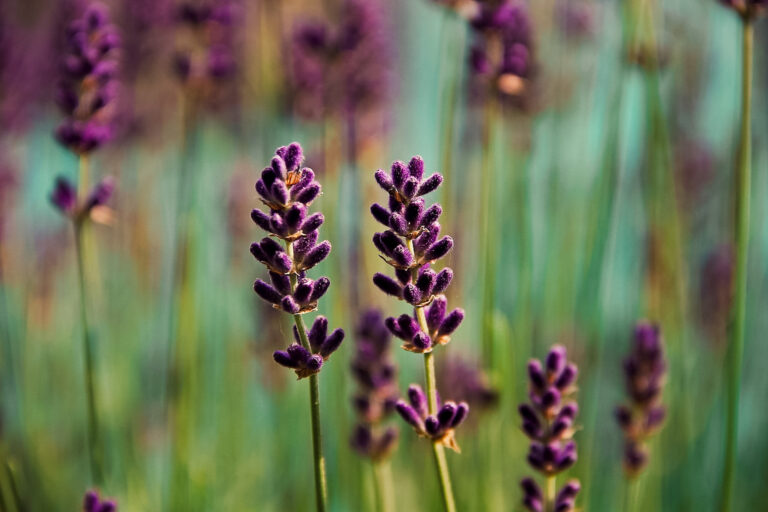
Lavender’s beautiful purple flowers and soothing aroma have been widely used for centuries as an herbal remedy due to its calming and relaxing properties. It is a popular choice in aromatherapy and is recognized for promoting relaxation and reducing symptoms of anxiety.
Lavender’s Calming Effects on the Nervous System
Lavender’s fragrance has been found to increase alpha wave activity in the brain. Its aromatic compounds, such as linalool and linalyl acetate, work together to calm the nervous system, inducing relaxation and easing tension.
Inhaling the scent of lavender brings a sense of tranquility, soothing the mind and reducing anxiety.
How To Use
Thankfully, there are various ways to harness the benefits of lavender for stress reduction.
1. Lavender Essential Oils
One popular method is adding a few drops of lavender essential oil to a diffuser and letting the scent fill the space.
Alternatively, add a few drops to a warm bath for a relaxing soak or dilute the essential oil with a carrier oil for a calming massage.
2. Lavender Tea
Steep dried lavender flowers in hot water for a few minutes, strain, and sip slowly. This aromatic herbal tea can be a delightful evening ritual to unwind and calm the mind.
It is important to note that while lavender can be beneficial, it may not be effective for everyone and should not be used in place of prescribed medication for chronic or severe cases of anxiety or depression.
Ensure you choose high-quality, organic lavender products for optimal benefits.
Incorporate this fragrant herb into your self-care routine, and let its soothing properties envelop you in a sense of serenity and tranquility!
2. Chamomile
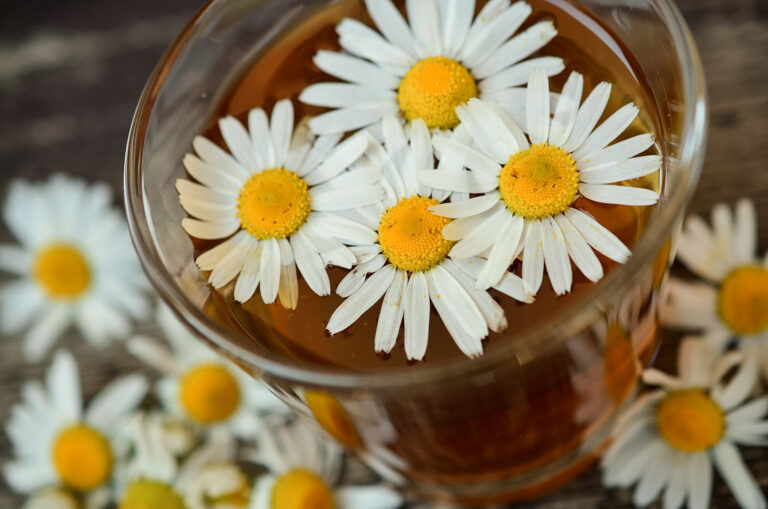
Chamomile, has delicate white flowers and a gentle aroma. It is a well-known herb renowned for its soothing properties that promote relaxation. Let’s delve into the reasons why chamomile is highly regarded for its calming effects.
Chamomile’s Soothing Properties That Promote Relaxation
Chamomile has long been cherished for its ability to induce a state of relaxation and tranquility. It contains bioactive compounds such as apigenin, which interacts with receptors in the brain, promoting a sense of calmness.
By soothing the nervous system, chamomile can help alleviate stress and anxiety, making it an excellent choice for those seeking a natural remedy for relaxation.
Binds to Benzodiazepine Receptors in the Brain
One of the fascinating aspects of chamomile is its interaction with benzodiazepine receptors in the brain. These receptors are responsible for regulating the body’s response to stress and anxiety.
Chamomile’s compounds have been found to bind to these receptors, producing an anxiolytic effect, similar to the action of benzodiazepine medications but without the extreme sedative side effects.
This interaction contributes to chamomile’s ability to promote relaxation and reduce feelings of tension.
How To Use
Chamomile can be enjoyed in various forms to experience its soothing benefits.
1. Chamomile Tea
Steep dried chamomile flowers in hot water for a few minutes, allowing the gentle aroma and beneficial compounds to infuse the liquid. Sip the tea slowly, preferably before bedtime, to help calm the mind and promote a restful sleep.
2. Chamomile Tincture
A few drops of chamomile tincture can be added to a glass of water or a cup of herbal tea for an enhanced calming effect.
3. Chamomile Topical Tea Compress
For topical use, chamomile can be utilized as a compress. Brew a strong chamomile tea, allow it to cool, and soak a clean cloth or cotton pad in the liquid. Apply the compress to areas of tension or simply place it over your eyes to enjoy a soothing, rejuvenating experience.
Always look for high-quality, organic chamomile products to ensure optimal benefits. Loose dried chamomile flowers or chamomile tea bags are readily available for brewing herbal tea at home. Tinctures and chamomile-infused skincare products can also be found in health stores and online retailers.
3. Ashwagandha

Ashwagandha, also known as Indian ginseng or winter cherry, is a powerful adaptogenic herb that has been used for centuries in traditional Ayurvedic medicine. Let’s explore the remarkable properties of ashwagandha and how it can help the body adapt to stress.
What is Ayurvedic Medicine?
In short, Ayurvedic medicine is one of the oldest holistic healing methods originating from India. It incorporates herbal remedies, meditation, massage therapy, and other “alternative” methods to cultivate overall health and wellness in the body and mind.
Adaptogenic Herb That Helps the Body Adapt to Stress
Ashwagandha is classified as an adaptogen, a special category of herbs that help the body adapt to various stressors, both physical and psychological.
It works by modulating the stress response system, supporting the body’s ability to cope with stress more effectively. Ashwagandha helps restore balance and resilience, allowing you to navigate stress with greater ease.
Ashwagandha Balances Cortisol Levels and Supports the Nervous System
One of the key mechanisms through which ashwagandha exerts its stress-reducing effects is by regulating cortisol, often referred to as the “stress hormone.” Chronic stress can lead to elevated cortisol levels, which can disrupt various bodily functions and contribute to feelings of anxiety and fatigue.
Ashwagandha helps balance cortisol levels, supporting a healthier stress response and promoting a sense of calmness. It also nourishes and strengthens the nervous system, helping to enhance overall well-being.
How To Use
Ashwagandha is available in different forms, providing flexibility in incorporating it into your wellness routine.
1. Ashwagandha Capsules
Follow the recommended dosage instructions provided on the product packaging or consult with a healthcare professional for personalized guidance.
2. Powdered Ashwagandha
You can mix the powder into a glass of warm water, milk, or your favorite smoothie. Customize the dosage according to your needs and preferences.
3. Ashwagandha Tea
Infuse a teaspoon of ashwagandha powder in a cup of hot water, steep for a few minutes, and strain. Sip the tea slowly to experience its calming and rejuvenating effects.
Embrace the adaptogenic powers of ashwagandha and integrate it into your wellness routine. By supporting your body’s natural ability to adapt to stress, ashwagandha can help restore balance, reduce anxiety, and promote overall well-being.
Remember to consult with a healthcare professional or herbalist for personalized advice on dosage and usage.
You can find ashwagandha products in health food stores and online herbal retailers. Look for reputable brands that offer high-quality, organic ashwagandha to ensure its potency and purity. Consider reading reviews and checking the credentials of the retailer before making a purchase.
4. Passionflower
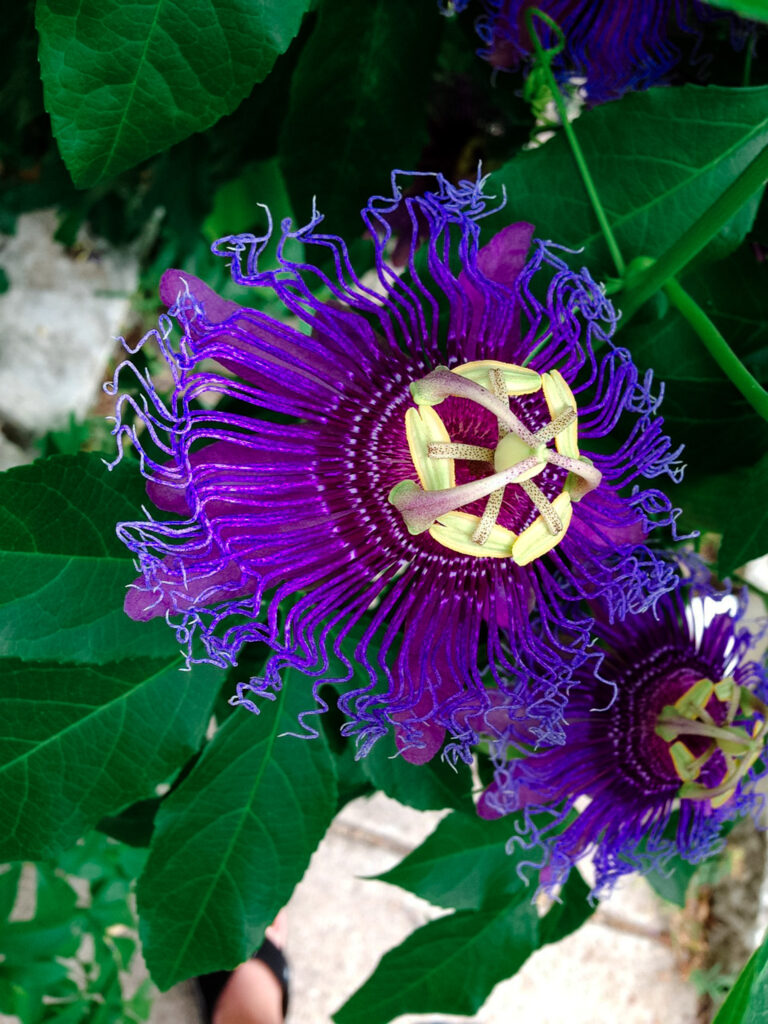
Of course passionflower has remarkable properties, just look at those stunning blossoms! It nearly looks otherworldly! Let’s explore the benefits of passionflower and how it can help reduce stress and promote better sleep.
Passionflower Increases GABA Levels, Inducing Relaxation
Passionflower is known to increase the levels of gamma-aminobutyric acid (GABA) in the brain. GABA is a neurotransmitter that inhibits excessive brain activity, promoting relaxation and reducing feelings of anxiety. By boosting GABA levels, passionflower helps calm the nervous system, soothing both the body and the mind.
Helps Calm Racing Thoughts and Promotes Better Sleep
If you struggle with racing thoughts and a restless mind, passionflower can be a valuable ally. Its calming properties help quiet the mind, allowing for a sense of inner peace and tranquility.
Passionflower is particularly beneficial for promoting better sleep by easing insomnia and supporting a more restful slumber. Its natural sedative effects can help you unwind, preparing you for a night of deep and rejuvenating sleep.
How To Use
Passionflower is enjoyed in various forms that induce its calming effects.
1. Passionflower Tea
Steep dried passionflower leaves and flowers in hot water for around 10 minutes, allowing the beneficial compounds to infuse. Sip the tea slowly before bedtime or during times of stress to induce relaxation.
2. Passionflower Tincture
Additionally, passionflower tinctures can be added to beverages or used topically. Follow the instructions provided on the product label or consult with a healthcare professional for proper dosage and usage.
For enhanced benefits, passionflower can be combined with other calming herbs such as chamomile or lavender. These synergistic blends can amplify the overall relaxation and soothing effects.
Passionflower products can be found in local health stores and online herbal retailers. Look for high-quality, organic passionflower leaves or flower products to ensure their potency and purity. It’s always a good practice to read reviews, check the credentials of the retailer, and consult with a herbalist for personalized recommendations.
5. Lemon Balm

Lemon balm has vibrant leaves and delightful citrusy fragrance, it is a versatile herb that offers calming effects. Let’s explore the benefits of lemon balm and how it can help reduce stress and anxiety.
Lemon Balm Increases GABA Levels and Reduces Anxiety-Related Symptoms
Similar to other herbs on this list, lemon balm is known to increase the levels of gamma-aminobutyric acid (GABA) in the brain. GABA is a neurotransmitter that helps regulate nerve activity, promoting a state of calmness and reducing anxiety-related symptoms.
Therefore, by enhancing GABA levels, lemon balm can help alleviate restlessness, nervousness, and promote a sense of inner peace.
How To Use
Lemon balm can be enjoyed in various forms to experience its calming benefits!
1. Lemon Balm Herbal Tea
Steep fresh or dried lemon balm leaves in hot water for several minutes, allowing the aromatic compounds to infuse. Sip the tea slowly and savor its soothing effects. You can also combine lemon balm with other herbs like chamomile or lavender for an extra relaxing blend.
2. Lemon Balm Tincture or Essential Oil
Follow the recommended dosage instructions on the product packaging or consult with a healthcare professional for personalized guidance.
For topical use, lemon balm essential oil can be diluted with a carrier oil and applied to the temples, wrists, or other pulse points for a calming effect. The gentle aroma can help promote relaxation and ease tension.
Embrace the calming properties of lemon balm as you incorporate it into your wellness routine. Whether sipping a warm cup of lemon balm tea, using a lemon balm tincture, or enjoying its gentle aroma through topical application, this versatile herb can help reduce stress, promote relaxation, and support your overall well-being.
6. Valerian Root

When it comes to calming the nervous system and promoting relaxation, Valerian Root is a popular herbal remedy with a long history of traditional use.
Valerian Root Promotes Relaxation by Calming Nerves
Valerian Root has been used for centuries as a natural relaxant. It has a gentle sedative effect on the nervous system, making it an excellent choice for those seeking relaxation and relief from stress and anxiety.
By calming the nervous system, Valerian Root can help ease tension and promote a sense of calmness.
Enhances GABA Activity in the Brain
Valerian root is believed to work by enhancing the activity of gamma-aminobutyric acid (GABA) in the brain. GABA is an inhibitory neurotransmitter that helps regulate nerve impulses, promoting a feeling of calmness and reducing anxiety. Valerian root’s interaction with GABA receptors in the brain contributes to its relaxation-inducing properties.
How To Utilize Valerian Root
Luckily, valerian root can be consumed in various forms, providing flexibility in finding the most suitable method for you!
1. Valerian Root Capsules
Capsules are a convenient option, allowing for precise dosage and easy ingestion. Follow the recommended dosage instructions provided on the product packaging or consult with a healthcare professional for personalized advice.
2. Valerian Root Tinctures
Additionally, tinctures are another popular way to use valerian root. These liquid extracts can be added to water or other beverages for consumption. Start with a small amount and gradually increase the dosage as needed, following the instructions on the product label.
3. Valerian Root Tea
Lastly, valerian root is also commonly enjoyed as a herbal tea. Steep valerian root in hot water for about 10 minutes, allowing the beneficial compounds to infuse. Sip the tea before bedtime or during times of stress to promote relaxation and a restful sleep.
Finally, always look for reputable brands that offer high-quality, organic valerian root capsules, tinctures, or dried root for tea. Reading customer reviews and ensuring the reliability of the retailer will help you make an informed purchase.
Incorporate valerian root into your stress-relief routine and experience its calming effects. Whether you choose capsules, tinctures, or herbal tea, valerian root can be a valuable ally in promoting relaxation and a sense of tranquility.
7. Rhodiola
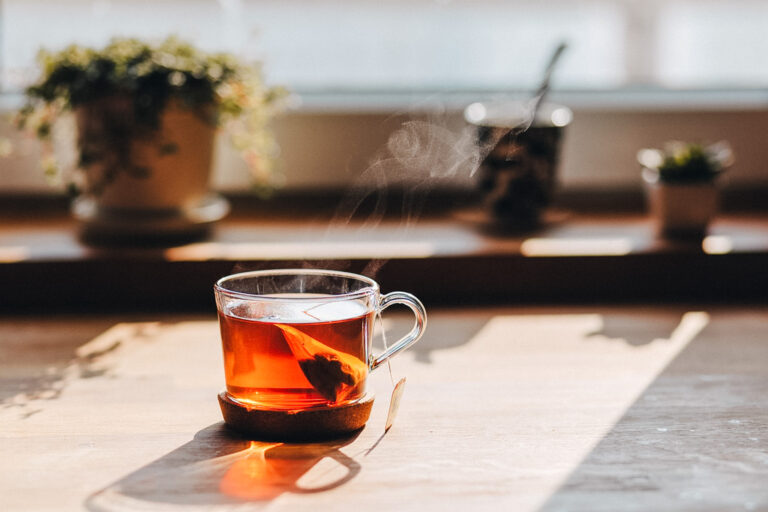
Rhodiola is an adaptogenic herb with a rich history in traditional medicine. It is renowned for its ability to support the body’s stress response and promote overall well-being. Discover its energizing and clarifying benefits!
Rhodiola is an Adaptogenic Herb That Supports Stress Response
Rhodiola is classified as an adaptogen, meaning it helps the body adapt to and manage stress more effectively. It works by supporting the body’s stress response system, helping to restore balance and promote resilience.
So, by modulating the body’s stress hormones and improving overall stress tolerance, Rhodiola can contribute to a more balanced and calm state of being.
Boosts Energy Levels and Mental Clarity
One of the remarkable properties of Rhodiola is its ability to enhance energy levels and mental clarity.
It supports the body’s natural processes, improving oxygen utilization and cellular energy production.
Rhodiola can help combat fatigue, improve focus, and promote a sense of alertness and mental sharpness. By increasing energy and reducing brain fog, Rhodiola can help you tackle daily tasks with renewed vigor.
How To Use
Rhodiola can be consumed in various forms, allowing you to choose the method that suits your preferences and lifestyle.
1. Rhodiola Capsules
Capsules are a convenient and standardized way to take Rhodiola. Follow the recommended dosage instructions on the product packaging or consult with a healthcare professional for personalized guidance.
2. Powdered Rhodiola
Powdered Rhodiola can be added to smoothies, juices, or other beverages, providing a flexible and customizable option. Start with a small amount and gradually increase the dosage as needed.
3. Rhodiola Tea
Steep Rhodiola root in hot water for approximately 10 minutes to extract its beneficial compounds. Savor the tea’s earthy flavor and enjoy its stress-reducing effects.
8. Ginseng

Ginseng, particularly Panax ginseng, is a renowned herb that has been treasured for centuries in traditional medicine.
Its adaptogenic properties make it a valuable ally in enhancing the body’s ability to cope with stress.
Let’s delve into the stress-relieving benefits of Ginseng and explore different ways to incorporate it into your wellness routine.
Ginseng Enhances The Body’s Ability to Cope with Stress
Ginseng is known for its adaptogenic qualities, meaning it helps the body adapt to various stressors more effectively.
It supports the stress response system, allowing the body to better cope with the physical and emotional demands of daily life.
By promoting resilience, Ginseng can help reduce the negative effects of stress and support overall well-being.
Balances Stress Hormones and Promotes Calmness
One of the remarkable attributes of Ginseng is its ability to balance stress hormones in the body, such as cortisol.
By modulating these hormones, Ginseng can help promote a state of calmness and relaxation.
It aids in soothing the nervous system and reducing anxiety, allowing you to face stress with a greater sense of composure.
How To Use
Ginseng can be consumed in various forms, providing you with flexibility and convenience.
1. Ginseng Capsules
Capsules and powdered Ginseng are popular options, offering standardized dosages and easy incorporation into your daily routine. Follow the recommended dosage instructions provided on the product packaging or consult with a healthcare professional for personalized guidance.
2. Ginseng Tea
Steep Ginseng slices or powdered Ginseng in hot water for about 5-10 minutes, allowing the beneficial compounds to infuse. Sip the tea slowly and enjoy its earthy flavor while reaping its stress-relieving benefits.
Conclusion
The journey to finding natural remedies for stress and anxiety is an exciting one filled with incredible possibilities.
However, it’s important to remember that not all supplements or brands of herbal products are created equally.
To make informed decisions while shopping for products to try, here are three tips:
Tip #1: Embrace Quality and Authenticity
Choose reputable brands that prioritize quality and source their herbs from trusted suppliers.
Look for certifications and positive customer reviews to ensure you’re getting the highest quality and safest products.
Tip #2: Demand Purity and Potency
Opt for products that undergo rigorous testing to guarantee purity, potency, and standardization. This ensures you’re getting the full benefits of the herbs without any compromise.
Tip #3: Seek Professional Guidance
Consult with a healthcare professional who understands your unique health needs. Their expertise will help you navigate any potential interactions with medications and ensure you choose the right herbs for your well-being.
Remember, these herbs have been treasured by cultures worldwide for centuries.
By exploring them, you’re tapping into a rich legacy of natural remedies that have stood the test of time.
Together, we can create a supportive community where experiences are shared, and knowledge is amplified.
Your experiences matter, so don’t forget to share your journey and insights in the comments below!

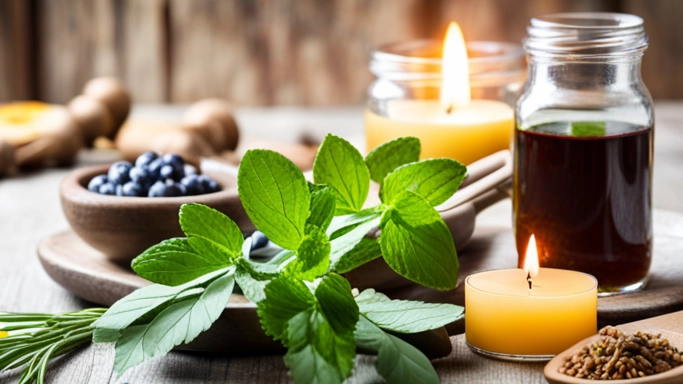
Leave a Reply